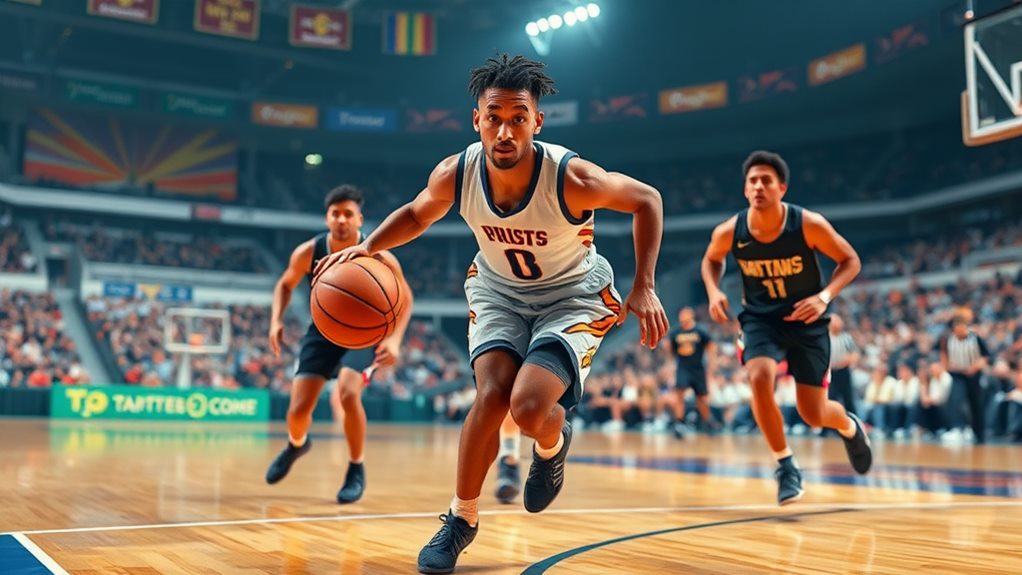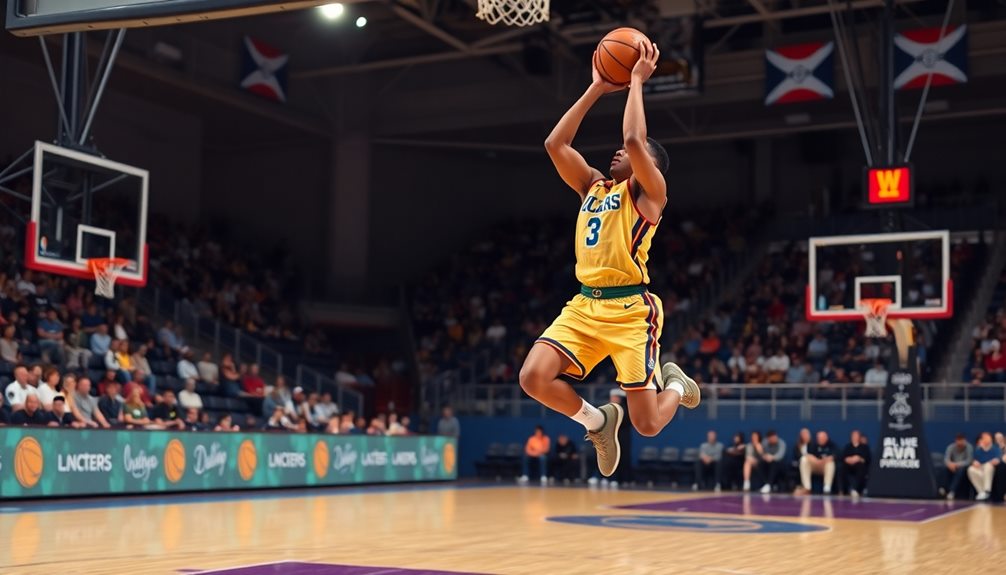
What Is a Small Forward in Basketball? Role and Skills
November 20, 2024A small forward in basketball is a versatile player who excels in scoring, playmaking, and defense. You typically use your height and athleticism, ranging from 6'6" to 6'9", to dominate both ends of the court. You'll shoot from three-point range, create opportunities off the dribble, and finish strong at the rim. Additionally, you guard multiple positions and contribute to rebounding, helping shift the game from defense to offense. Key skills include ball handling and footwork, which position you for offensive success. If you're curious about some legendary small forwards or statistical expectations, there's more to explore.
Definition and Role
The small forward (SF) position stands out in basketball for its unique blend of skills and responsibilities. As a small forward, you're a versatile player, vital for both offensive and defensive roles on the court.
You excel in various scoring methods, including using your shooting ability from three-point range, finishing strong at the rim, and executing effective mid-range shots. Your ball-handling skills are essential, allowing you to create opportunities not just for yourself, but also for your teammates. In a similar vein to how defenders work collaboratively in soccer to thwart attacks, small forwards must also understand their teammates' movements to optimize scoring chances.
Defensively, you're expected to guard multiple positions, showcasing your adaptability in various defensive schemes. Whether it's man-to-man or zone defense, small forwards play a significant role in executing team strategies.
Your capacity to pull down defensive rebounds further enhances your value, helping to shift the game from defense to offense.
Physical Attributes
Typically, small forwards boast a unique combination of height, speed, and strength that sets them apart on the court. In the NBA, players in this position usually range from 6'6" to 6'9", while WNBA small forwards measure between 6'0" and 6'2". This size allows you to effectively compete against both guards and forwards, making you versatile in your gameplay.
The evolution of athletes in various sports, including soccer's growth of professional leagues, showcases the significance of athletic attributes in achieving competitive success.
Your physical attributes are vital for excelling in both offensive and defensive roles. With a blend of athleticism and skills, you can quickly guard agile players while standing strong against bigger opponents. This balance is essential for maintaining your effectiveness on the court.
Moreover, your height and wingspan make you an effective rebounder, enabling you to secure boards against taller players. Small forwards need to utilize their speed to dart into position and their strength to box out opponents.
This combination of physical attributes not only enhances your ability to score but also contributes to your team's defensive efforts, making you a well-rounded player capable of impacting the game in multiple ways.
Scoring Techniques

With your unique physical attributes, you can leverage a variety of scoring techniques that make you a constant threat on the court. Your quick first step and ball-handling skills allow you to attack the rim effectively, scoring through layups or powerful dunks, especially in movement or after driving past defenders.
To enhance your scoring prowess, it's crucial to embrace consistent practice, as regular drills and exercises build muscle memory and help refine your techniques.
In addition to finishing at the rim, you excel in mid-range shooting. Techniques like pull-up jumpers and fadeaways create scoring opportunities when defenders close in on you.
Your proficiency in three-point shooting is also significant; by using off-ball screens and catch-and-shoot methods, you can capitalize on open perimeter shots.
Don't forget about your footwork and positioning, which are crucial for scoring from the baseline. You can cut to the basket or receive passes for quick shots that catch defenders off guard.
Incorporating off-ball movement and clever cuts helps you exploit defensive lapses, leading to easy scoring opportunities near the basket or open jump shots.
Mastering these techniques guarantees you're not just a scorer but a versatile offensive player who keeps defenses on their toes.
Notable Small Forwards
When you think of notable small forwards in basketball, names like LeBron James and Larry Bird immediately come to mind. These players haven't only excelled in their roles but have also left an indelible mark on the game.
The small forward position is known for its versatility and ability to contribute both offensively and defensively, making it one of the most dynamic roles on the court. Here's a quick look at some of the most influential small forwards:
- LeBron James – Widely regarded as one of the greatest of all time, LeBron combines scoring, playmaking ability, and rebounding to lead teams to multiple NBA championships.
- Larry Bird – A three-time NBA champion, Bird was known for his exceptional shooting, basketball IQ, and fierce competitiveness, making him a cornerstone for the Boston Celtics in the 1980s.
- Kevin Durant – This two-time NBA champion and four-time scoring champion showcases versatility and lethal scoring ability, creating shots from virtually anywhere on the court.
- Scottie Pippen – An elite defender and playmaker, Pippen played an essential role alongside Michael Jordan, securing six NBA championships with the Chicago Bulls.
Additionally, Maya Moore stands out in the WNBA for her all-around game, leading the Minnesota Lynx to four titles.
Each of these small forwards has redefined excellence in basketball, showcasing skills similar to those highlighted in soccer moves guide.
Statistical Expectations

Small forwards play a vital role on their teams, and their statistical outputs reflect the diverse responsibilities they hold. Typically, you can expect small forwards to average between 15 to 25 points per game, emphasizing their importance as significant scorers.
Additionally, small forwards often showcase their versatility by contributing to both offensive and defensive plays, similar to how centers adapt their roles to enhance team dynamics and scoring potential the evolution of positions. In addition to scoring, they usually grab around 5 to 8 rebounds per game, showcasing their role in both offensive and defensive rebounding efforts.
When it comes to playmaking, small forwards often contribute around 3 to 5 assists per game. This highlights their responsibilities in facilitating offensive plays and creating opportunities for teammates.
Defensive statistics are just as essential; top small forwards generally average about 1 to 2 steals and nearly 1 block per game, underscoring their impact on the defensive end.
The versatility of small forwards truly sets them apart, as they can influence multiple statistical categories. Their balanced contributions across points, rebounds, assists, and defense make them indispensable.
Whether you're analyzing a game or evaluating player performance, understanding these statistical expectations will give you a clearer picture of a small forward's role and value on the court.
Conclusion
In the grand game of basketball, the small forward is your versatile hero, much like Robin in the Batman duo. They blend agility with skill, ready to adapt to any challenge on the court. With their scoring finesse and defensive prowess, small forwards are vital to a team's success, driving plays and igniting the crowd's enthusiasm. So, whether it's a game-winning shot or a vital steal, you can count on them to deliver when it matters most.


